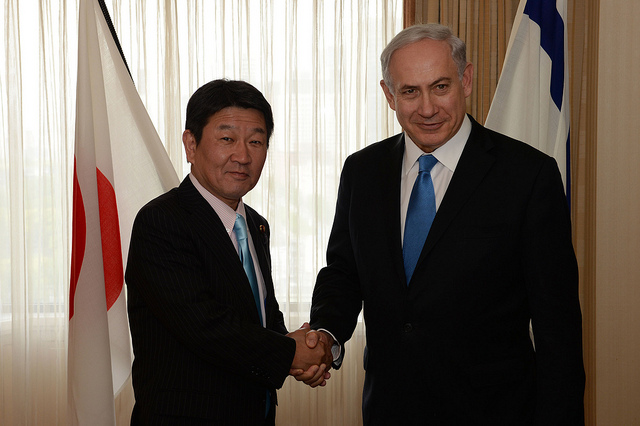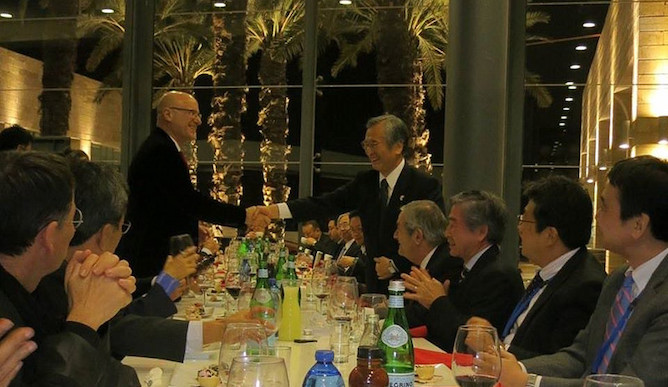Israel is extending a big baruch haba (“welcome” in Hebrew) to the East Asian island nation, and Japan is bidding Israel kangei (“welcome” in Japanese) as business ties between the two countries pick up speed in recent months.
The first splashy news on this front happened in February, when the Japanese company Rakuten acquired Israeli messaging app Viber for some $900 million. The latest big news is the July 7 signing of a collaboration agreement for joint industrial R&D projects between Israeli and Japanese companies and organizations, the first agreement of its kind that Japan has ever signed.
Though import-export activity has been steady ever since diplomatic relations were established between Israel and Japan in 1952, the Viber deal piqued the interest of many Japanese companies interested in Israeli technology, says Japan-Israel Chamber of Commerce Chairman Roni Bornstein.
“Israel has developed in areas such as high-tech, medical devices and pharmaceuticals. Now you even have some Israeli companies such as Iscar and Teva Pharmaceuticals taking over Japanese companies,” Bornstein tells ISRAEL21c.
One of his top priorities is to encourage Japanese giants such as Panasonic, Toshiba and Toyota to consider Israel for research and development. “We don’t see joint ventures or R&D centers like you do with so many large American companies such as Microsoft, IBM and GE.”
He says Japan is becoming more open to collaborations with other countries after its economic crisis of 2011. “Last fall, a delegation from the Keidanren [Japanese Business Federation] headed by Yoshiyu Nakamura came to Israel to visit various industries, and we think it’s an important turning point.”
A visit from the prime minister
Bornstein was in Tokyo in May when Israeli Prime Minister Benjamin Netanyahu addressed 180 opinion-makers and business leaders in Japan — the world’s third-largest economy – during a five-day visit to meet with political and business VIPs including Prime Minister Shinzo Abe and Panasonic Chairman Shusaku Nagae.
“I believe that this meeting did lead to results,” Bornstein tells ISRAEL21c. “Netanyahu’s words to the businessmen were enthusiastically received, and high-level discussions are gaining momentum.”

Japanese Minister of Economy, Trade and Industry Toshimitsu Motegi accepted Netanyahu’s invitation to come to Israel, arriving in July with a delegation from his ministry and from Japanese industry. He signed the joint cooperation agreement during his visit.
In the early days of trade between Japan and Israel, the Jewish state was exporting traditional commodities such as diamonds, fruit and chemicals. “At a certain point, the trade was balanced — $1.5 billion for each side,” says Bornstein.
The balance began tipping in Japan’s favor in 1995 with the export of Japanese cars and electronics, as well as machinery for high-tech industries such as chipmaker Intel. In 2013, Israeli exports to Japan reached $ 762.3 million, while Japanese exports to Israel totaled $1.4 billion.
In the other direction, Israeli companies including chocolatier Max Brenner; skincare brands Laline, Ahava and Sabon; jewelry-maker Michal Negrin and network-security software developer Check Point have established a market presence in Japan over the past decade.
Following the Viber deal, Bornstein is fielding an unprecedented number of inquiries. “Japan still is not very strong in Internet technology, so they’re looking for opportunities in Israel,” says Bornstein.
Netanyahu pointed out that Israel and Japan are both “democratic, progressive, technological societies” and emphasized Israeli expertise in his remarks to corporate executives.
“Cyber-security is a growing need and a central need for your businesses. This is something Israel is developing by leaps and bounds on a global scale and we are open to participation not only with governments, but also with companies,” he told them. “And indeed the biggest companies in the world in this field and related fields are now coming to Israel to invest in cyber-security and we invite you to do the same.”
Navigating cultural waters
One of the critical tasks of the Japan-Israel Chamber of Commerce is ironing out cultural differences that could trip up Israeli business people. For example, in Japan it’s important to present one’s business card with two hands.
“Japan has its own mentality and language, of course, as well as its own business manners,” Bornstein says. “When you go there, you need to know the cultural traditions, and we are bridging that gap.”
Last year, the chamber was awarded a special prize by the Foreign Ministry of Japan.
Bornstein explains that the chamber of commerce helps potential importers or exporters in Israel to “swim in the big ocean of Japan” by providing expert advice and referrals.
He hopes that Israel’s national airline, El Al, will someday soon offer direct flights between the two countries. Though many Israelis visit Japan, especially during cherry-blossom season, tourism in the other direction is not as strong.
The chamber does make sure its members can meet business delegations visiting from Japan. “The personal touch is important,” Bornstein says. “When you do business with Japan, a lot is based on loyalty and personal relationships rather than contracts.”
For more information, see www.israel-japan.org














